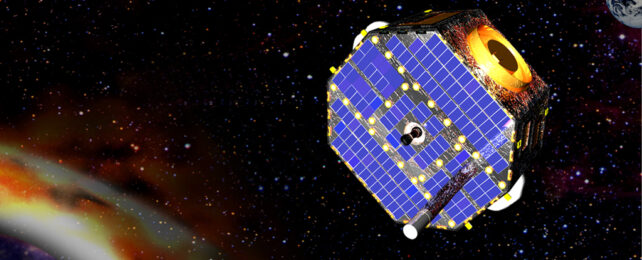NASA fixes malfunctioning spacecraft the same way you fix your troublesome laptop
When faced with a potentially mission-ending problem with NASA's 15-year-old Interstellar Boundary Explorer (IBEX) spacecraft, engineers performed a time-honored procedure to fix it: They turned it off and then turned it back on again.
Success! IBEX is now fully operational again.
Actually, they told the spacecraft to turn itself off, and IBEX – which unlike the famous HAL in 2001: A Space Odyssey – obeyed the command and then turned itself back on again.
On February 18, IBEX experienced an anomaly and the flight computer reset itself during a planned contact with Earth. But something didn't work right and IBEX put itself into a "contingency mode."
NASA said that while flight computer resets have happened before, this time the team lost the ability to command the spacecraft during the subsequent reset recovery.
The team also was unsuccessful in regaining command capability by resetting ground systems hardware and software.
All other systems appeared to be functional, but no commands were being processed, essentially making the spacecraft not operational.
Of course, in space there's a more 'official' term for the 'turn off, turn on again' power cycle reboot that we've all done with a finicky computer.
It's called a firecode reset, which is an external reset of the spacecraft. This was done on March 2, and done preemptively instead of waiting for the spacecraft to perform an autonomous reset and power cycle, which was scheduled for March 4.
Engineers decided to take advantage of a favorable communications environment around IBEX's perigee – the point in the spacecraft's orbit where it is closest to Earth.
The command worked, and IBEX is functioning normally again.
IBEX has been operating nearly flawlessly since it launched in October 2008. Its mission is to map the boundary where winds from the Sun interact with winds from other stars.
IBEX is an exceptionally small spacecraft, about the size of a bus tire, and does its work of observing the solar system boundary while in orbit around Earth.
It has "telescopes" that look out toward the edge of the solar system, but these telescopes collect particles instead of light.
From IBEX, we have the first all-sky map of the heliosphere, which revealed a surprise: the maps are bisected by a bright, winding ribbon of unknown origin. Scientists are still working with IBEX data to understand this phenomenon.
This article was originally published by Universe Today. Read the original article.
